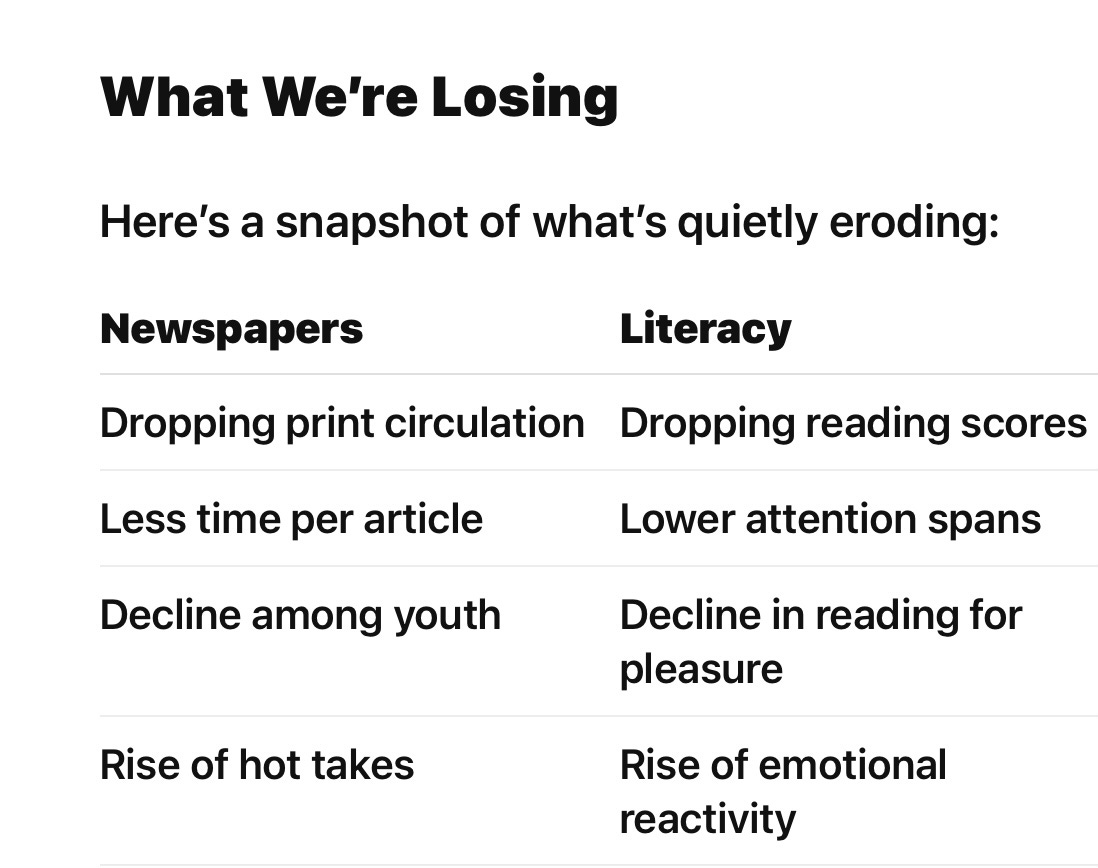The Real Stink: How We Forgot to Read and Started to Rot
The problem isn’t just Biden or Trump. It’s us. And our brains are too fried to notice.
Garbage is garbage, even if it’s well-packaged. But we’ve become experts at arguing over which pile smells worse. Biden? Trump? Take your pick. We’ve been trained to choose sides, sniff hard, and declare moral superiority.
What we haven’t done is ask the harder question: How did we get here?
We point to Biden’s age, Trump’s narcissism, or the latest poll panic—but those are just symptoms. The disease runs deeper, and it’s creeping under the radar: we’ve lost the very muscle we used to use to understand the world. The reading muscle. The attention muscle. The thinking muscle.
We didn’t just stop reading newspapers. We stopped reading, full stop.
The Death of the Paper, the Dimming of the Mind
Let’s start with the obituary:
Print newspaper circulation in the U.S. has cratered—from 63 million in 1984 to 24 million in 2020.
Only 12% of adults still read a physical newspaper daily.
For Americans under 30? That number drops to 5%.
About 23% of adults haven’t read any book in the past year—triple the percentage from 1978.
And when people do read news online? They spend 15 to 20 seconds per article. Most don’t even scroll down.
Let that sink in. Our attention span for public affairs is now shorter than a TikTok ad.
And yet we wonder why our political landscape feels like a malfunctioning reality show run by the inmates.
Limbic System in a Candy Store
We didn’t just abandon newspapers—we replaced them with something stronger, cheaper, faster: the digital dopamine IV drip. Scrolling. Swiping. Consuming content that stimulates, outrages, amuses—but never asks for anything in return.
Our brains have gone primal. The limbic system—the part that governs emotion and instant gratification—is now running the show, while the prefrontal cortex—reason, foresight, analysis—sits quietly in the back, under-stimulated and underused.
We’ve become toddlers in a media candy store, stuffing our faces with empty-calorie content. No wonder our intellectual metabolism is shot.
Consequences, Exhibit A: Us
The civic cost of all this isn’t theoretical. It’s measurable.
Longitudinal studies show that people who regularly read newspapers—print or digital—score significantly higher on:
Civic knowledge
Voting rates
Community engagement
Translation: people who read are more likely to know what the hell is going on, why it matters, and what to do about it.
Those who don’t? They react. They rage. They vote on vibes.
Sound familiar?
What We’re Losing
Here’s a snapshot of what’s quietly eroding
:
Reading real news—not tweets, not clips—requires patience, comprehension, synthesis, memory. That’s hard work. It builds citizens.
Watching video headlines or rage-scrolling? That builds consumers. Emotional ones. And emotional consumers are easy to manipulate.
So Here We Are
A country of people who can’t focus long enough to finish an article, arguing about which puppet smells worse while the puppeteer counts his money.
We met the enemy. It’s not Biden. It’s not Trump.
It’s us.
And until we stop bathing in the algorithm’s glow and start reading again—really reading—we’ll keep mistaking noise for knowledge. And garbage for leadership.






I read all the way to the end! I should earn a prize! 🏆🤓